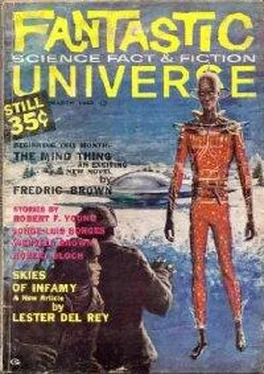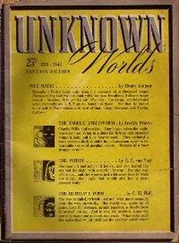The Mind Thing
by Fredric Brown
The mind thing used his perceptor sense to test this strange and alien environment in which he found himself. He had no organs of vision or hearing, but his perceptor sense was something far better; he could “see” all around himself, very clearly for about twenty yards, tapering to dim vision for another twenty or so, but his seeing was unimpeded by intervening objects. He could see the bark on the far side of a tree as plainly as that on the near side. He could see down into the ground as far and as clearly as in any other direction. His ability to sense vibrations extended even farther and was extremely acute within its range.
He could not only see but “hear” worms burrowing in the ground under him; they were puzzling, for no such life form existed in any other world he knew of. But they seemed to offer no danger. Nor did a few small birds in the trees overhead. They were almost familiar; bird life tends to evolve along quite similar lines on all warm planets that have atmospheres dense enough to permit natural flight. (But what monstrous trees they perched in! They were several times as large as any he had ever known.) And there was a strange four-legged animal sleeping in a burrow, a tunnel in the ground which it seemed to have made for itself, only about ten yards away.
Since the four-legged one was sleeping, the mind thing knew that he could enter into its mind, make it his host. But there seemed nothing to gain. Where there were small creatures there were almost certainly larger ones, with more strength and brain capacity. Possibly even…
Yes! His second scanning of his surroundings showed him something he had not noticed on the first one. Lying in the grass a dozen yards away was a rusted broken-bladed jackknife that had been thrown away or lost there. He didn’t recognize it for a jackknife, but whatever it was it was plainly an artifact. And an artifact meant intelligent life.
It meant danger, too. Intelligent life could be inimical, and he was small and vulnerable. He had to know more about the intelligent life form, preferably by catching its first specimen when it was sleeping, so he could enter its mind. He could learn more that way than by any amount of observation.
He was in an exposed position right beside what seemed to be a path. He had to get himself at least as far as the tall grass a yard away where he would be out of sight. Such concealment would be useless, of course, against his own kind or any other race that had perception instead of sight. But the chances were thousands to one that the intelligent creatures here, whatever they might be like otherwise, had only sight. He knew that on none of the thousands of known planets had both vision and the sense of perception developed side by side. One or the other, only. And here the birds and the small four-legged animal all had eyes.
He tried to levitate himself to move that yard, and found that he could not. He was not surprised. He had already suspected from several indications that this, compared to his own world, was a heavy-gravity planet. And his species, even on their own planet, had almost lost the power of levitation. Levitation was a strain, and since they all had hosts it was so much easier to have their hosts move them, when moving was necessary, than to levitate. An unused power diminishes as surely as an unused muscle atrophies.
So he was helpless, until and unless he could find a host strong enough to move him. And the only creature sleeping nearby, the only one he could take over and make a host, was definitely too small, probably weighed about half what he did. Of course he could reduce his weight somewhat by trying to levitate while the four-legged—
Suddenly, at extreme range he perceived something, and concentrated all his attention in that direction. If danger was coining there wasn’t time now to experiment with using the small animal to move him into concealment.
At first it was only vibration, vibration that could have been footsteps, footsteps of something relatively large. And there was another type of vibration that came through the air and not through the ground, that was like the sounds certain types of creatures, usually intelligent ones, who communicated vocally, used for that purpose. There seemed to be two voices, one higher in the vibration range than the other, talking alternately. Of course the words meant nothing to the mind thing, nor could he probe their thoughts; his species could communicate telepathically but only among themselves.
Then they came within range of visual perception. There were two of them. One was slightly larger than the other, but they were both big. Obviously they were members of the intelligent race, or an intelligent race, for they both wore clothing—and only intelligent races wear clothing, during a certain period of their development. They stood erect, and had two legs and two arms apiece. Also hands—and that would make them excellent hosts, but there was no time to think of that now. His problem was survival, until he could catch such a creature sleeping.
They were of a two-sexed species, he saw—for though he perceived their clothing his perception was not limited thereby; he could have studied their internal organs as readily as their nude bodies—and they were one of each sex. They were mammalian.
But the important thing was that they were coming closer, they were walking along the path and they would pass within one or two feet of him; they could hardly miss seeing him.
Out of desperation he grabbed at the mind of the only host available, the small four-legged one. He took no time to probe or study it; he started it scurrying madly out of its burrow. He’d have it intercept the two aliens. What would happen then he didn’t know, but he had nothing to lose. He was less helpless with a small, weak host than with none at all. Perhaps, although it was unlikely, the tiny life form might be dangerous to the large strong life forms. Perhaps it was venomous or equivalently deadly in some other way. All over the galaxy there were planets on which some small life form was able, in one way or another, to terrorize larger creatures. It was at least equally possible that the two-legged creatures would look upon the little four-legged one as food and try to catch it to eat. In that case, he hoped the little creature could run as fast as they; if it could, he could have it lead them off the path for a while until they were safely past him. Then it would be safe to have them catch it and kill it.
It would have to be killed, or kill itself, in any case. Just as the only way he could enter a host was while it slept, the only way he could leave one was at the moment of its death. And this host was too frail and tiny a thing for him to want to use any longer than he had to stay in it.
* * *
Charlotte Garner stopped walking suddenly, and because she had her right arm linked with Tommy Hoffman’s left he stopped too, so unexpectedly in his case that he almost went off balance for a second. He looked at Charlotte and saw that she was looking down at the path in front of them.
“Look, Tommy,” she said. “A field mouse. And look what it’s doing!”
Tommy looked. “I’ll be darned,” he said.
The field mouse, right in the middle of the path and not much over a foot away from them, was sitting up like a prairie dog. But quite unlike a prairie dog, it was waving its little front feet frantically, as though trying to signal to them. And its sharp little eyes looked directly up into theirs.
“I never saw one act like that,” Charlotte said. “It acts as if it’s friendly, not afraid. Maybe someone made a pet out of it, and then it got away—but still likes people.”
Читать дальше












